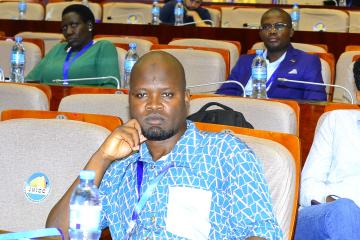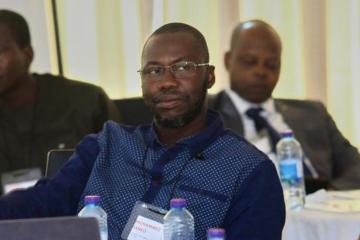Regional Scholars Opportunities

The Digital Agricultural Innovations and Services Initiative (DAISI) is invested in creating more opportunities for regionally-based scholars to develop and drive the research agenda in sub-Saharan African and South Asia forward.
We are excited to present funding opportunities for resident African and South Asian Scholars—those who have completed a PhD in economics or a related field and are based at an academic institution in sub-Saharan Africa or South Asia.
Announcement
-
Please watch the recording of our Regional Scholars program launch webinar for more information about our upcoming RFP, program details, and tips for applying for DAISI funding
-
Remember to register for the African or South Asian Scholars database for updates on information, events, and funding opportunities.
Research Funding Opportunities
DAISI does not have any open research funding opportunities.
-
Resident Regional Scholars include those who have completed a PhD in Economics, Agricultural Economics, or a related empirical discipline and are currently based in an academic institution in sub-Saharan Africa or South Asia.
-
Resident Regional Scholars are eligible to apply for Proposal Development Grants (up to US$10,000) and Pilot Grants (up to US$75,000). Full-scale RCT funding eligibility (up to US$500,000) is extended to Regional Scholars who have successfully completed a pilot funded by a J-PAL or CEGA initiative. For additional funding details, please see our RFP web page.
Targeted mentorship will be provided to Regional Scholars who receive funds from DAISI.
-
Mentors will advise the scholar throughout the project. Mentors can include any J-PAL or Center for Effective Global Action (CEGA) affiliate or DAISI invited researcher. Regional Scholars may either identify an eligible mentor before submitting a proposal or will be connected to one after their proposal has been selected by the DAISI board.
-
Regional Scholars are required to submit an agreement signed by themselves and their mentor prior to the disbursement of funds. This agreement provides a framework for how the scholar and mentor will work together throughout the project. Scholars who are matched to a new mentor will be expected to have a phone call with the mentor before completing this agreement.
An existing relationship with a J-PAL or CEGA mentor is not a requirement for the selection of Regional Scholar projects. However, if you do have an existing relationship with a J-PAL/CEGA affiliated professor or invited researcher, who you would like to serve as a mentor, we will take this preference into consideration (though we cannot promise specific mentor relationships). It will be useful to understand how well the mentor and mentee know each other (i.e., past research experience and length of existing relationship), as well as the amount of time the mentee/mentor has committed or will commit to the project.
Please refer to the African Scholars Frequently Asked Questions for more information for researchers based in sub-Saharan Africa. While this FAQ is catered to African Scholars, please note that the content is also relevant to scholars based in South Asia. If any scholars have questions about the applicability of the answers to the South Asian context, please contact [email protected] and we can assist you.
Capacity Building Opportunities
1. Take the J-PAL MicroMasters Course
Anyone is welcome to audit the online course for free. However, participants are required to pay a fee to take the course exam which is required for course credit. Learn more on our MicroMasters webpage.
2. Scholars Webinars
The Digital Identification and Finance Initiative (DigiFi) hosted a webinar series for African Scholars that covers some of the fundamentals of running randomized evaluations. We encourage folks to listen to the recorded sessions if they are interested.
-
DigiFI Africa Scholars webinar with Jessica Goldberg (University of Maryland) – Introduction to randomized evaluations with application to her fingerprinting study in Malawi – Session recording
-
DigiFI Africa Scholars webinar with Patrizio Piraino (University of Notre Dame) – Sample size and power – Session recording
-
DigiFI Africa Scholars webinar with Emily Cupito and Gabe Tourek (J-PAL Africa) – How to write a good research funding proposal? – Session recording
3. CEGA Transparent and Open Science Research Course
Anyone is welcome to take this five-week open online course for free. The course introduces learners to threats to research credibility and reproducibility, and tools and practices for ethical, transparent, and reproducible social science research. Learn more here.
4. Resources for Regional Scholars
The J-PAL team has identified some resources that may be useful for Regional Scholars who would like to refine their skills in randomized evaluation and research design.
What are randomized evaluations? How are they different from impact evaluations?
A randomized evaluation is a type of impact evaluation that uses random assignment to allocate resources, run programs, or apply policies as part of the study design. Like all impact evaluations, the main purpose of randomized evaluations is to determine whether a program has a causal impact and, more specifically, to quantify how large that impact is.
Impact evaluations measure program effectiveness typically by comparing outcomes of those (individuals, communities, schools, etc.) who received the program against those who did not. There are many methods of doing this, but randomized evaluations have the benefit of ensuring that there are very limited systematic differences between those who receive the program and those who do not, thereby producing accurate (unbiased) results about the effects of the program. For more information see J-PAL’s introduction to randomized evaluations.
Training in randomized evaluations
J-PAL runs Evaluating Social Programs courses that are based in different locations around the continent. This is intended to give an overview of randomized evaluations for a policy practitioner audience. Please check this page for updates on the next course. For those who cannot attend the course in-person, we have lecture recordings, slides, and case study materials for most of the ESP sessions in J-PAL's Teaching Resources.
J-PAL also hosts an online training course in designing and running randomized evaluations (J-PAL102x). This course teaches learners how to both design randomized evaluations and implement them in the field to measure the impact of social programs. It is a twelve-week long course and can be audited for free. The course runs three times a year—in spring, summer, and fall.
African Scholar video series
J-PAL has started a video series for Scholars on a wide range of topics, from how to make your funding applications more competitive to practical tips for running successful randomized evaluations.
- How to write a competitive grant proposal video and guide
- Budgeting for a randomized evaluation guide
- How to build effective implementing partner relationships guide
More videos and guides will be released in the next couple of months.
Further reading on randomized evaluations
- For a broad overview of how to design an RCT, please refer to “Using Randomization in Development Economics Research: A Toolkit” by Esther Duflo, Rachel Glennerster, and Michael Kremer (January 2007).
- We encourage all interested individuals to read Rachel Glennerster and Kudzai Takavarasha's book Running Randomized Evaluations: A Practical Guide. Further information can be found on this website.
- For an overview of experiments in development economics see “Field Experiments in Development Economics” by Esther Duflo (January 2006). Also see “Use of Randomization in the Evaluation of Development Effectiveness” by Esther Duflo and Michael Kremer (July 2003).
- Another good resource is “Impact Evaluation in Practice” by Paul Gertler, Sebastian Martinez, Premand Patrick; Laura Rawlings, and Christel M. Vermeersch (September 2016).
Access all of J-PAL’s research resources here.



